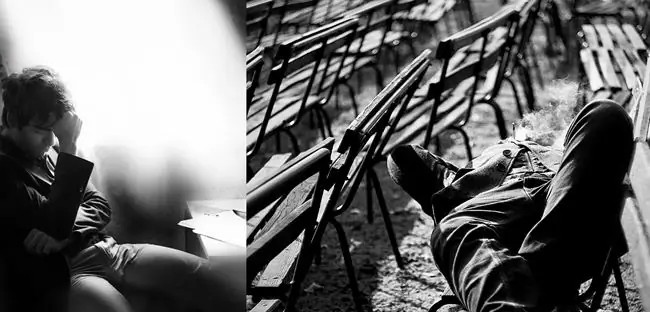- Author Adrian Jeff jeff@psychologosportal.com.
- Public 2023-12-17 05:06.
- Last modified 2025-01-24 14:09.
Hikikomori. Black tears under the covers at the monitor
He had already stopped wondering why he was waking up. And there were no thoughts about the mood for a long time. Woke up so woke up. Without pulling anything over his panties, he sat down at the computer, with the usual pressing of his hand turned on this machine, which connects it with reality. A new day has begun …
Slava slowly opened his eyes. The last ray of light barely made its way into the room. Almost six in the evening, flashed through his head. Well. Good fucking morning. I did not want to get up - the day again did not portend anything but alienation. But he had already stopped wondering why he was waking up. And there were no thoughts about the mood for a long time. Woke up so woke up. Without pulling anything over his panties, he sat down at the computer, with the usual pressing of his hand turned on this machine, which connects it with reality. A new day has begun.

Don't leave the room, don't make a mistake.
Why do you need the Sun if you smoke Shipka?
Everything behind the door is meaningless, especially the exclamation of happiness.
Just go to the restroom and return immediately.
Joseph Brodsky.
Who flips the toggle switch
Slava has long wanted nothing. He could not even get a regular job, because several times a year he was covered with a wave of a state in which he felt like a vegetable. He never knew when this period would come - a time of alienation, closeness and some kind of total internal anxiety. The inability to manage neither time, nor his own state, nor desires gradually led him to the idea of hopelessness. All the talk about how you can pull yourself together seemed monstrously funny to him. Take? Into your hands? Usually - he is a young handsome guy who had every chance of becoming promising.
In that ordinary life, girls even like him. But that ordinary life does not last long. Then suddenly this difficult period of alienation comes again, when you don't want to see anyone, you don't want to wake up, you don't want to live. As if someone switches some kind of toggle switch inside - and he is no longer free to dispose of himself. Food, sleep and any other pleasures become unaffordable luxuries for him. If it were not for his mother, who periodically comes in to bring food and somehow support, he probably would not have thought about food. I want to howl at the moon. But even this does not work. Maybe bump into the wall. Or hang out in the computer on the rare days of enlightenment.
How long is this period of estrangement?
Sometimes several months. But in fact, he stopped counting long ago. With such a life schedule, you can't really jump on a horse. Job? - No one can stand a guy who can develop social phobia at any moment. The only thing left was to apply your mathematical skills in poker. Actually, on this he makes a living. When he lives.
Girls? - Sooner or later they leave him. And he, returning to that ordinary life, realizes that he is not free to keep them and least of all would like to harm them. Doctors cannot determine what is wrong with him. Prescribed medications don't help. Do they facilitate his existence during exacerbated states? Hardly. And, in fact, what does it matter.
In this life, he has no desires, except for one, breaking through as an SOS signal from the depths of his soul: to wait until he lets go again.
Hello i am hikikomori
Don't leave the room. Oh, let the room only
guess what you look like. And in general, incognito
ergo sum, as the substance has noticed in the form in the hearts.
Don't leave the room! On the street, tea, not France.
Joseph Brodsky.
Attacks of Slava's estrangement, unfortunately, are not isolated. Young people with similar problems of perception of the world around them are more and more common. In Japan, this has become a social phenomenon of hikikomori (Hikikomori - "to come off, to withdraw, to be eliminated", "to be imprisoned,"). In other words, hikikomori is a special disorder of social adaptation of adolescents and young people, consisting in alienation and avoidance of contact with people. A few years ago, psychologists argued that in Japan there are up to 1 million hikikomori - about a fifth of all young people, 1% of the total population of the country. Among people, hikikomori experience discomfort, fear, feelings of inferiority, and panic. And if doctors are fighting social phobia with psychotherapy, tranquilizers, antidepressants and anxiolytics that relieve anxiety,then the hikikomori themselves solve the problem in their own way - by alienating themselves from society.

Here is what Russian hikikomori write about themselves:
“I haven't left the house for three years, it looks like I'm a hikikomori. He was an ordinary - even funny - person, he studied, worked, tried to comply with the norms of society: to get a "high school", find a job, start a family. So I lived up to 23 years old, and then troubles began to happen to me: I broke up with my girlfriend, relatives threw me for a lot of money, quit a good job in order to move to another company, and then they refused at the last moment … Gradually I began to withdraw into myself, alienate, lose friends. At first, I lived at the expense of my savings, which, with my modest existence, was enough for 1.5 years. Then he began to live at the expense of his parents. I felt like I was being ridiculed. And the result is three years of loneliness and no goals, desires ahead. I leave the house only in the morning, around five o'clock, to buy a snack, and sometimes to run in the stadium. Now I still want to get out of this state of alienation, but all attempts so far end in failure. But I want to become a part of this, albeit unfair, but society, and not my individual world, in which I have locked myself from all adversity."
“Children can turn into hikikomori if their parents suppress their individuality, so it was with me, and I have been hikikomori for several years now, though not as tough as in Japan. I rarely go outside, I don't communicate with anyone, except my family, except my father. He always suppressed me before and now he does not know how to communicate with me, only to teach. For 90% of the townsfolk, we will continue to be ordinary simulators, freeloaders, lazy people, dullards and weaklings."
“From a psychological point of view, the society does not attract me absolutely, in fact, as I am. The reasons for crossing with him are purely practical and economic."
But there are other cases as well. A reader of the forum said that she had found one hikikomori, from whose words she understood that the decision to retreat was "an absolutely healthy desire based on a faded interest in people." “No problems preceded this. He had an institute, friends, and a girlfriend. I just got tired, it began to weigh on me. One day he decided to spend some time alone with himself in order to understand the root of the problem, but in the end he came to the conclusion that there was no need to understand anything. After all, you can just sit in your room and not go anywhere, voluntarily becoming a hikikomori, - the girl writes. “When I started asking him questions, trying to delineate his personality more clearly, the guy delicately noticed that he didn’t want to talk anymore and disconnected from ICQ.”

What is the root of hikikomori's evil?
Do not be an idiot! Be what others were not.
Don't leave the room! That is, give free rein to the furniture, blend your face with the wallpaper. Lock up and barricade yourself with a
closet from chronos, space, eros, race, virus.
Joseph Brodsky.
"There is a lot of information on the net about hikikomori, but these articles do not open anything new for me," wrote a reader of one of the forums. What is known about them? The fact that they prefer virtual reality to society, if possible, do not leave the premises on the street, sleep during the day, watch TV at night, play on the computer, surf the Internet or chat, read or just stare at the wall for hours. They live on the support of relatives.
There is a feeling that hikikomori become out of laziness (parents provide something) and unwillingness to win their place under the sun (weaklings who are not capable of anything). However, the hikikomori themselves often write on the Internet that they do not know how to get out of the state of alienation into which they have driven themselves. The mechanism of this alienation was launched, and hatred of society, irritability from uncertainty about the future and understanding of one's aimless life make life unbearable for hikikomori. The thought that periodically visits him to get rid of this state of alienation dissolves into total powerlessness and meaninglessness of existence. And attempts to change something fail miserably.
But all this does not happen overnight. Before locking the door of their room, hikikomori goes through a path of social isolation. They are pressured by their parents, humiliated by their peers, they often feel their inferiority and insecurity, gradually becoming more and more unhappy. They are more often angry with themselves for their helplessness and sometimes, not seeing solutions to get rid of alienation, they are aggressive towards relatives (especially when they demand “to do something, not sit in their rooms”) and to themselves - they can injure themselves, end their lives suicide.

And yet, where do modern "samurai" come from? According to the studies of Japanese psychologists, hikikomori are those who cannot find themselves in society, are unable to fulfill their social role and find their "real I", "myself." The phenomenon of hikikomori, as observed by psychologists, is characteristic of the middle class. In poor families, hikikomori are not found allegedly due to the fact that children, including those with communication problems, are forced to earn a living, in other words, "go to people." There is no time for alienation.
Psychologists describe this phenomenon of hikikomori, its consequences, but cannot indicate the roots of the causes of the need for social alienation. Another vision of this phenomenon is offered by Yuri Burlan at the training "System-vector psychology", based on the fact that the scenario of a person's life is built from the desire to receive pleasure and be happy. He strives for this within the framework of the vectors given to him by nature, which determine certain desires in a person. In other words, “we do not think, but we think”. When we get pleasure, we are happy. And what quality this happiness is depends on the development and realization of the vectors. Internal wretchedness or incomplete deficiencies, emptiness, do not leave a person with options to get full enjoyment. He has only one way left - to enjoy the way available to him.
The alienation of hikikomori is due to various reasons. Perhaps among them there are those who deliberately parasitize on their parents. But more often the hikikomori goes its own way of social maladaptation in search of an answer to the questions: why does he live and who needs it?

The search for the meaning of one's own existence is not becoming a fix idea for everyone. And Japanese researchers have not in vain noticed that in poor families there is no time to think about the absolute categories of life, philosophy and other nonsense seeming to most people. But for people with a sound vector, who are considered hikikomori in society, these searches are not just a whim, but a species role that they unconsciously perform in any conditions and on any landscape. The only question is to what extent their development allows them to fulfill their role in the modern landscape with dignity, in the spirit of the times.
Sound scientists are geniuses in potential. And if the realized vector of one person can lead to a breakthrough in any particular sphere, at the level of the nation - to a new idea of organizing society, and in general - to a new round of human development, then the unrealized one, on the contrary, leads to suicides, cataclysms in the country and global irreversible consequences for humanity.
More and more children are taking part in computer games and joining the ranks of hikikomori. Hikikomori is not a distant eastern scary tale, it is today's reality. Will they turn into social outcasts filled with alienation, or will they be able to find a worthy place in life?






